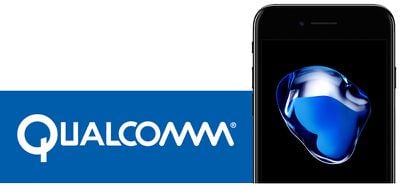As the FTC's antitrust trial against Qualcomm continues, Apple's chief operating officer, Jeff Williams, has taken the stand to share details on the terms of Apple's contracts with Qualcomm.
There's no live feed of the trial, but reporters including CNET's Shara Tibken and Florian Mueller of FOSS Patents are attending and sharing details on what Williams has to say.

Most interestingly, Williams says that Apple had wanted to use both Qualcomm and Intel chips in the iPhone XS, XS Max, and XR despite the ongoing legal battle between Apple and Qualcomm, but Qualcomm ultimately would not sell it the modems because of the fight.
"The strategy was to dual source in 2018 as well," said Williams. " "We were working toward doing that with Qualcomm, but in the end they would not support us or sell us chips."
Williams went on to explain that after Qualcomm CEO Steve Mollenkopf refused to sell Apple the chips, Apple had to contact Intel CEO Brian Krzanich to supply LTE chips for all of the 2018 iPhones. "We would have loved to continue to have access to Qualcomm's tech," said Williams.
Williams also detailed many of Apple's past interactions with Qualcomm. In 2011, when Apple negotiated a contract to use Qualcomm as a supplier for modems instead of Infineon because of Apple's need for CDMA-compatible chips, Qualcomm demanded a percentage of the iPhone's cost.
The two companies ultimately negotiated a rebate that brought the total royalty fee down to $7.50 per iPhone, though Apple had wanted to pay $1.50 per phone, equivalent to 5 percent of the value of the baseband chip, which was $30. Under the terms of that deal, though, Apple had to agree to a "marketing incentives agreement" to speak out against the WiMax standard that was popular at that time.
With the "marketing incentives agreement," rebates Apple received from Qualcomm would need to be reimbursed should Apple ship a device with a baseband chip from a Qualcomm competitor.
When it came time to renegotiate contracts in 2013, Qualcomm wanted to increase the $7.50 fee by an additional $8–$10, which would have cost Apple upwards of a billion dollars in annual licensing costs. To lower that fee, Qualcomm wanted exclusivity, which Apple accepted because it needed Qualcomm's chips.
Apple accepted the deal, which also prevented the company from challenging the fairness of Qualcomm's royalty rates or inducing others to challenge Qualcomm's licensing terms, which is the position Apple has been stuck in for several years.
Apple was finally able to diversify with the launch of the iPhone 7, the first iPhone to use chips from both Qualcomm and Intel, and it challenged Qualcomm's licensing terms in January 2017 with the launch of the initial Apple v. Qualcomm lawsuit.
Apple and many other Qualcomm partners are involved in Qualcomm's legal battle with the FTC, with the FTC suggesting that Qualcomm has been using anticompetitive tactics to remain the main supplier for baseband processors for smartphones.
The FTC v. Qualcomm trial will be continuing through most of January, so we are likely to hear additional details about Qualcomm and Apple's business practices.























